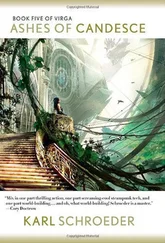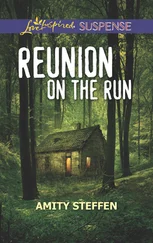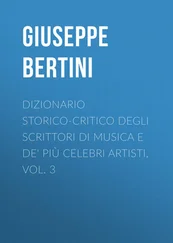Her face clouded. “I don’t want a new school. I like my school.”
“Why do you like your school if you can’t be yourself there?”
“My friends are there.”
“Then you should skip a grade. Something .”
“I don’t want to skip a grade. Then I wouldn’t be in class with my friends.”
“Why are you punishing yourself for being smart?”
“You always say that. You always say that. You always say the same things! I listen to you, but you don’t listen to me!”
She crossed her arms and snapped her head toward the window. Just like that, I had lost hold of her.
“I’m sorry,” I said.
Beneath us, the bus engine labored in a lower gear. We passed a sign for Albany, New Hampshire, but neither of us made a joke about it.
“You deserve a better father. But instead you got me.”
She looked down at her lap, her eyes glassy. Then she tilted her head just a touch to the side, as if accepting a counterargument from her more dutiful self, giving me — because she couldn’t help it — yet one more benefit of the doubt.
“Listen,” I said. “It would take too long for me to apologize for everything. It would take my whole life. And we’ve only got”—I checked my watch—“two hours and fifteen minutes until we get to Boston. Which parts do you want to hear about?”
She looked up, out the window. “I want to hear about the times you were happy.”
I nodded. The bus turned toward someplace called Tamworth.
“I’ll tell you about happiness,” I said. “The time I was most happy in my life was when I met your mother.”
She smiled but did not turn her head.
“Now, every little thing about your mom and me is true. No take-backs.”
She turned now, her gums showing. “Tell me.”
“We met because a boy fell out of a tree.”
“You’re teasing.”
“Am not. A boy plopped out of a tree and broke his wrist, and your mother was helping him. Everybody — everybody was watching — and I saw her and I fell in love with her on the spot…”
All the way to Nashua, I told her about it. The gifts of tea and apricots, the honeymoon in Virginia Beach, the tidal pools, your pregnant cravings, your enormous belly, her birth, how she didn’t cry when she was born, the pretty music of her favorite mobile, the birth of Stinky Blanket, the smell of calendula oil, winters, branches, and good silences.
A middle-aged woman got on in Nashua. She wore a white cardigan and store-fresh jeans and carried her purse clamped between breast and elbow. From the looks of her, I hoped she’d content herself with a seat farther up the bus. But after rejecting the other seats for some reason or another, she settled down diagonally from us.
After a while, I noticed this woman staring at us. I looked at her, and she smiled tightly and returned to her magazine. My blood went cold. Here was exactly the sort of zealot who would watch television shows in which regular people are encouraged to help apprehend fugitives.
“Heading to Boston?” she asked finally, creasing her magazine against her leg.
I tried to ignore her.
“Are you heading to Boston?” she asked, louder.
“Excuse me?”
“I said are you going to Boston.”
“Yes, we are.”
“You don’t have any games or anything for the little girl? You don’t have any pencils or paper for her to draw on?”
“No. Games? I — no, I don’t.”
The woman cocked her head backwards in chagrin. “Such a long trip. A long time for a little girl to sit with nothing to do.” She began to dig in her purse. “Let me see if I have something for her to draw with. Would you like a colored pencil, sweetheart? Ugh. All I’ve got is a pen, and nothing to draw on.”
“We’ll be all right,” I said, relieved.
The woman shrugged. “Still.”
“Thanks for your concern.”
“Still. It’s a long trip without anything to do.”
I turned and looked at Meadow, who was grinning. I winked at her.
“Hey, Daddy,” she whispered.
“What?”
She waved me closer. “You know what that lady doesn’t know about us?”
“What?”
Then she brought her face very close to mine, just like she used to do before she got her glasses, and put one hand on my shoulder. “She doesn’t know how big our imaginations are.”

We stood outside of South Station, wearing matching green shamrock baseball caps that I’d bought at a kiosk. I grabbed Meadow’s hand.
“By God, Boston has a smell ,” I said. “Do you smell that? It’s kind of boggy or peaty. Not gassy, like New York.”
It was a windy, late afternoon, but the sun still shone on Boston. I’d planned to go straight to Dad, but once I stepped out into Boston, I thought of everything that my real past now offered up in a fascinating if slightly down-market passel of attractions. Hell, this was way better than an aristocratic country-club childhood on the Cape — this was Boston , seat of Colonial America, home of the Red Sox. We wandered into the city’s small but festive Chinatown and walked with throngs of tourists along Essex until I caught the splinter of someone’s gaze, someone looking at us wrong. I turned down toward Harrison Ave. toward Kneeland, which felt safer. I was not safer in Boston than I was in the wilds of the Northeast Kingdom, but I felt safer, because Boston was the city of my youth, and when I was still quite young, over no objections from my father, I often took the T all the way to town from Savin Hill, not far, not far at all.
We went out of our way to stop in front of the John Hancock building and let its mirrors make us dizzy. We walked all the way to Copley Square and stared at the library, whose facade glowed as bone white as any Coliseum with the last afternoon light. There we bought roasted cashews from a cart and sat eating them amongst the drunks and the pigeons. We walked into the Copley Plaza Hotel and pretended we were guests. We tried to count the crystals on the chandelier. I inquired about the cost of staying overnight and, flipping through my billfold, thought better of it. The paucity of my funds turned a screw of anxiety. I’d lost a thousand bucks behind a le Carré novel on a shelf in Vermont. I knew time was running out. I knew this was our grand finale. I wanted her to have anything she wanted.
After a scoop of ice cream for her and some Canadian Club for me in the Ivy Room, we set off again. Trekking down Boylston Street, Meadow began to lag behind.
“Daddy. I’m tired.”
“Tired? What do you need? You need to do the Dew?”
“We’ve been walking a long time.”
“Come on,” I said. “You’re fine. You’re on fire. We’re almost to the Common. Don’t you want to ride the swan boats? You haven’t visited Boston until you’ve done that.” I squinted at the sky. The boats had probably stopped running for the day.
“And then can we go to Grandpa Otto’s house?”
“Don’t worry,” I said. “We’ll get there soon.”
“All right. Can I ride your shoulders, Daddy?”
“Sure, Butterscotch. Up we go.”
And I was her camel, and we were crossing the Sahara, and she laughed when I ran beneath the willows, galloping through the swarms of strolling people across the stone bridge of the lagoon in the Public Gardens, saying, “Pardon me, excuse me, pardon me, camel behind you.” We slipped into line just as the attendant drew the cordon closed behind us, and we rode on the last swan boat of the day, sliding across the lagoon trailed by a line of sooty-looking goslings.
Читать дальше













